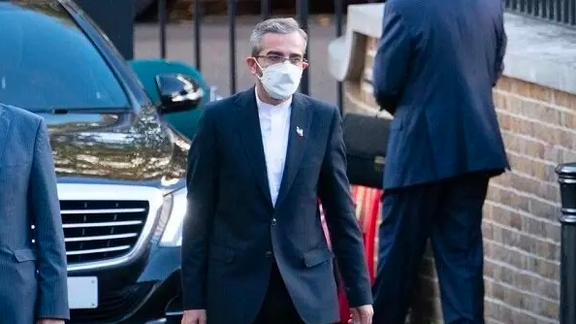Make-Up Of Iran's Nuclear Negotiating Team Shows Focus On Sanctions

The heavy presence of financial officials in Iran's new negotiating team highlights Tehran’s focus on lifting US sanctions in talks starting in Vienna, Monday.

The heavy presence of financial officials in Iran's new negotiating team highlights Tehran’s focus on lifting US sanctions in talks starting in Vienna, Monday.
"Actions now matter more than mere words. We should be offered a clear and transparent mechanism to ensure that sanctions will be removed," Iran's chief negotiator, Ali Bagheri-Kani wrote in an op-ed in the Financial Times Sunday about Iran's approach to the talks in Vienna.
"We will be starting these new discussions under circumstances influenced by the unfortunate fate of the JCPOA," he wrote, referring to US president Donald Trump's decision to withdraw from the 2015 nuclear deal, the Joint Comprehensive Plan of Action, in 2018. Bagheri-Kani also emphasized that sanctions relief must be verifiable, and a guarantee should be offered that there will be no future withdrawal from any agreement reached between the parties.
The six-member team headed by Ali Bagheri-Kani will resume the talks Iran suspended in June, two days after the presidential elections that brought hardliner Ebrahim Raisi to power. The new team insists that all sanctions imposed after 2018, which include sanctions related to human rights, support for terrorism and money laundering, have to be lifted in addition to nuclear sanctions.
Austrian journalist Stephanie Liechtenstein said in a tweet that Iran's delegation that arrived in Vienna Saturday is very large with up to forty members.
The presence of "prominent experts and officials involved with the phenomenon of unjust sanctions in recent years" and the new team's "considerable differences" with the negoting team in the previous administration demonstrates Iran's resolve for a "clear-cut and complete political and economic agreement," the official news agency (IRNA) wrote Sunday.
The new team consists of Reza Najafi, deputy foreign minister for legal and international affairs and Iran's former envoy to the IAEA. The rest are banking and financial experts: Ebrahim Shaybani, former Central Bank governor, Gholamreza Panahi, Central Bank deputy governor for international affairs, Ali Fekri, deputy economy minister and head of the Investment Organization, Ahmad Asadzadeh, caretaker of oil ministry's international and trade department, and Mehdi Safari, the economic diplomacy deputy of the ministry of foreign affairs.
Nearly all the team's members have also served as envoys or representatives to international organizations in the past.
Since June, Iran has vastly expanded its stockpile of 60-percent enriched uranium which according to Iran's nuclear chief Mohammad Eslami has now reached 25kg.
Given that 15kg of 90% enriched uranium is needed to build a nuclear bomb, Iran could be a month away from acquiring enough fissile material, the Revolutionary Guards (IRGC) affiliated Fars news agency said in a commentary Sunday. But it added that this assumption based on "Western logic", while Iran's nuclear program is peaceful and claimed that it continues to be supervised by Non-Proliferation Treaty (NPT) safeguards.
Iran and the UN nuclear watchdog IAEA failed to reach an agreement over monitoring of nuclear sites during IAEA chief Rafael Grossi's visit to Tehran last week.
Western powers may suggest in the new round of talks, Fars said, to offer Iran the easing of oil sanctions in return for stopping its 60% enrichment and allowing IAEA to resume its inspections within the framework of NPT's Additional Protocol the voluntary implementation of which Iran has stopped.
The news agency that often reflects the views and positions of the IRGC argued that such an offer and an interim agreement could only be considered if "Iran's presence in the oil market" was "guaranteed".